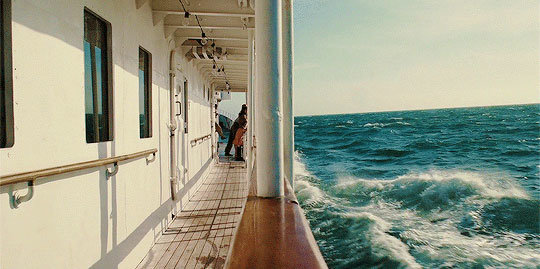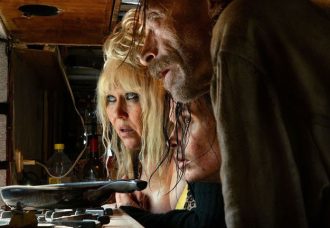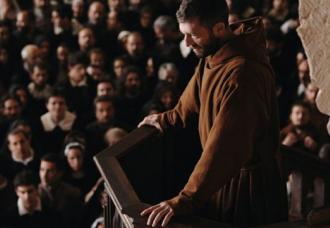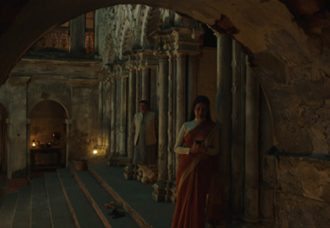The Master
Paul Thomas Anderson is not an easy American filmmaker to characterize but his work is perhaps best understood as an American response to European art cinema of the post-war years. Classical Hollywood cinema or studio filmmaking from the 1920s onwards has insisted on a plot which is driven by individual motivation and, as David Bordwell notes, European art cinema from Neo-realism onwards positioned its narratives in opposition to Hollywood. It relied on looser causal linkages and with less dependence on the motivated individual.
European films ranging from Bergman’s Wild Strawberries (1957) and Fellini’s La Strada(1954) to Jean-Luc Godard’s Breathless (1960) and Michelangelo Antonioni’s The Passenger (1975) are about people who, rather than being goal-oriented, are either unable to act decisively or are reflecting on the results of the past actions. The two major principles of European art cinema revolve around ‘realism’ which means allowing ‘life’s untidiness’ into cinema instead of striving for emotional satisfaction, and for authorial expressivity – the issue of what the director wants to say becoming important. ‘Ambiguity’ is a key notion here because ambiguity allows us to interpret authorial intent.
Once European art cinema captured the imagination of art house audiences around the world, some American filmmakers also broke away from Hollywood in their mode of narration. Coppola’s The Conversation (1974) displays ambiguity like Antonioni’s Blow-Up (1966) to which it has been compared. Other American filmmakers who eschew individual motivation in narrative construction include Robert Altman (Three Women, 1977), Martin Scorsese (Taxi Driver, 1976) and David Lynch (Mulholand Drive, 2001).
An aspect of the ‘realism’ in European cinema is that its characters are psychologically complex and do not subscribe to the ‘goal-orientation’ of Hollywood heroes. PT Anderson is best understood as an American director in the European mould whose exercises in narration revolve around characters who sometimes seem focused as in There Will be Blood (2007) but whose unexpectedly complicated lives do not find the direction that they would have liked. The Master (2012), his latest offering, is more engrossing than the earlier film but it also reveals the weaknesses of his approach more clearly.
In The Master Freddie Quell (Joaquin Phoenix) is a sex-obsessed alcoholic World War II veteran suffering from post-traumatic stress disorder, and possible brain damage from drinking ‘torpedo juice’ struggling to adjust to a post-war society. During his transition, a military specialist performs an inkblot word association test. After each innocuous image he replies with a sexual reference. He becomes a portrait photographer at a local department store, but is soon fired for getting into a fight with a customer. Freddie then finds work on a cabbage farm, but his moonshine poisons one of the elderly migrant workers and he is chased off the farm. The film takes quite a long while to establish Freddie’s character but after this, the rest of the film is about his coming into contact with Lancaster Dodd (Philip Seymour Hoffman), author of philosophical books and the leader of a movement known as ‘The Cause.’ The characters in the film are Freddie, Dodd, members of Dodd’s family and his followers and the relationship between Freddie and Dodd is the key one being explored. Dodd is drawn to Freddie because of a brew he makes with paint thinner but Dodd also sees possibilities and hidden depths in Freddie.
Freddie is put through several sessions by ‘the Master’ in which various facts emerge about his earlier life which included his father’s death, his mother’s institutionalization and incest with an aunt. Freddie also abandoned Doris, the love of his life, and never returned to her although he has often thought of going back. After spending a long time with Dodd’s group, Freddie goes back to Doris but learns that she is married and with children. He therefore leaves without meeting her. Dodd is a charismatic figure with a huge following but he is perpetually getting into trouble with the police, once for practicing medicine without being qualified because he often cures people of ailments. While Dodd usually keeps his cool, Freddie assaults a policeman and becomes uncontrollable although Dodd tries to quieten him. Eventually, Freddie is seen as a threat by Dodd’s family and he leaves the group. He goes back later when Dodd has moved to England but the film ends with Freddie alone and his prospective relationship with the group not spelt out.
As already acknowledged, The Master is extremely watchable but that is because of the actors – especially Philip Seymour Hoffman as Dodd – and one is uncertain about how to understand the film. The figure of Dodd was apparently inspired by Ron Hubbard, the founder of Scientology (best known for its association with Tom Cruise), but if Hoffman is charismatic in the role, he was not less so in Mission Impossible 3 (2006) as the villain, and one cannot assert that his performance is better realized here.
The trouble with Dodd is that he appears to be presented ‘as he is’ – which is a strange claim for a fictional creation. The same thing can be said about the central relationship in the film between Freddie and Dodd since it is neither about domination nor devotion and proceeds as randomly as a relationship in real life might have proceeded. PT Anderson is perhaps trying for a ‘realism’ that fiction from Hollywood has not traditionally allowed and is deliberately leaving his film without emotionally satisfying high-points because that is ‘the way life is’. It may be recollected that There Will be Blood, which is about the ruthlessness of an oil tycoon, peters off by the end in a comparable simulation of ‘real life’. I began this review by making a connection between PT Anderson and European art cinema and I should perhaps cite a European art film dealing with domination and interpersonal power in a comparable way to explain Anderson’s failure and the closest examples are perhaps RW Fassbinder’s films about homosexual/ homosocial relationships.
Fassbinder has made more than one film about all male relationships and personal domination and the most rewarding one is perhaps The Third Generation (1979). The film is about a terrorist organization in which various people – with different kinds of attitudes – work but in which a charismatic individual gradually assumes control. What makes the organization in The Third Generation much more real than the one in The Master is Fassbinder’s recognition that reality is constituted by actions and happenings which are never in consonance with one another. Unlike a scenario from Hollywood, the actual world is full of ‘noise’ and the charismatic leader gains ascendance not only by being heard over the noise but also by using the dissonance cunningly and ‘politically. There would, for instance, be rivalries within an organization which a leader would need to exploit.
The problem with the ‘real’ world constructed in The Master is that it is too much like a Hollywood scenario in which everything originates in the individual. The film relies, like other Hollywood films, on the personas of his actors – perhaps believing that action can only stem from there. PT Anderson also appears to think that he can break away from traditional Hollywood narration – and its deeply purposeful world – by casting actors of another kind and leaving the film ‘open-ended’. Most Hollywood stars exude transparency, the sense that we are privy to their innermost impulses. The characters played by Tom Hanks, Brad Pitt and Tom Cruise appear completely ‘knowable’ and this is something we can never be certain of with real people. PT Anderson casts Joachim Phoenix, who is a different kind of actor, as his protagonist to work against this possibility. Joachim Phoenix’s most memorable role was perhaps as the villain in Gladiator (2000) but the actor, while being much more opaque in the characters he plays, does not have it in his repertoire to suggest an unstable individual on the verge of a collapse, which is how Freddie should appear.
A French actor like Michel Daniel Auteuil could have managed this but perhaps no contemporary Hollywood actor, who is always striving after a stable persona in her/his quest for stardom. Lancaster Dodd is charismatic but there is no sense to be got that he is capable of deliberate manipulation. Neither Joachim Phoenix nor Philip Seymour Hoffman also has the capacity to appear ‘vulnerable’ – allow performance to drop off, as it were – and this works against whatever intent PT Anderson may have when he tries to portray a ‘real’ relationship. The result of all this is that the narrative makes very little emotional progress and nothing really develops. While the film strives for ‘ambiguity’, what it only manages is to be inconclusive.
<The above review originally appeared in Bikas Mishra‘s film publication, ‘Dear Cinema’>
IMDB link of Paul Thomas Anderson’s The Master








